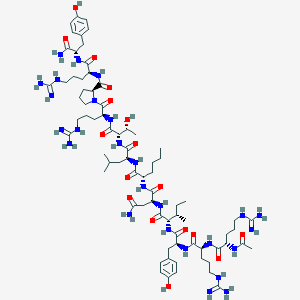

You can:
| Name | CID 72711150 |
|---|---|
| Molecular formula | C75H124N26O17 |
| IUPAC name | (2S)-2-[[(2S,3S)-2-[[(2S)-2-[[(2S)-2-[[(2S)-2-acetamido-5-carbamimidamidopentanoyl]amino]-5-carbamimidamidopentanoyl]amino]-3-(4-hydroxyphenyl)propanoyl]amino]-3-methylpentanoyl]amino]-N-[(2S)-1-[[(2S)-1-[[(2S,3R)-1-[[(2S)-1-[(2S)-2-[[(2S)-1-[[(2S)-1-amino-3-(4-hydroxyphenyl)-1-oxopropan-2-yl]amino]-5-carbamimidamido-1-oxopentan-2-yl]carbamoyl]pyrrolidin-1-yl]-5-carbamimidamido-1-oxopentan-2-yl]amino]-3-hydroxy-1-oxobutan-2-yl]amino]-4-methyl-1-oxopentan-2-yl]amino]-1-oxohexan-2-yl]butanediamide |
| Molecular weight | 1661.98 |
| Hydrogen bond acceptor | 21 |
| Hydrogen bond donor | 28 |
| XlogP | -2.5 |
| Synonyms | N/A |
| Inchi Key | CGXFKTPQEYTPLQ-BZGDUZLMSA-N |
| Inchi ID | InChI=1S/C75H124N26O17/c1-8-10-16-48(92-65(112)55(38-57(76)106)98-69(116)58(40(5)9-2)99-67(114)54(37-44-24-28-46(105)29-25-44)97-64(111)49(18-12-31-87-73(80)81)91-61(108)47(90-42(7)103)17-11-30-86-72(78)79)63(110)96-53(35-39(3)4)66(113)100-59(41(6)102)70(117)94-51(20-14-33-89-75(84)85)71(118)101-34-15-21-56(101)68(115)93-50(19-13-32-88-74(82)83)62(109)95-52(60(77)107)36-43-22-26-45(104)27-23-43/h22-29,39-41,47-56,58-59,102,104-105H,8-21,30-38H2,1-7H3,(H2,76,106)(H2,77,107)(H,90,103)(H,91,108)(H,92,112)(H,93,115)(H,94,117)(H,95,109)(H,96,110)(H,97,111)(H,98,116)(H,99,114)(H,100,113)(H4,78,79,86)(H4,80,81,87)(H4,82,83,88)(H4,84,85,89)/t40-,41+,47-,48-,49-,50-,51-,52-,53-,54-,55-,56-,58-,59-/m0/s1 |
| PubChem CID | 72711150 |
| ChEMBL | CHEMBL2440194 |
| IUPHAR | N/A |
| BindingDB | 50441963 |
| DrugBank | N/A |
Structure |  |
| Lipinski's druglikeness | This ligand has more than 5 hydrogen bond donor. This ligand has more than 10 hydrogen bond acceptor. This ligand is heavier than 500 daltons. |
You can:
| GLASS ID | Name | UniProt | Gene | Species | Length |
|---|---|---|---|---|---|
| 41713 | Neuropeptide Y receptor type 1 | P25929 | NPY1R | Homo sapiens (Human) | 384 |
| 41715 | Neuropeptide Y receptor type 2 | P49146 | NPY2R | Homo sapiens (Human) | 381 |
| 41714 | Neuropeptide Y receptor type 4 | P50391 | NPY4R | Homo sapiens (Human) | 375 |
| 41716 | Neuropeptide Y receptor type 5 | Q15761 | NPY5R | Homo sapiens (Human) | 445 |
zhanglab![]() zhanggroup.org | +65-6601-1241 | Computing 1, 13 Computing Drive, Singapore 117417
zhanggroup.org | +65-6601-1241 | Computing 1, 13 Computing Drive, Singapore 117417